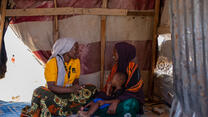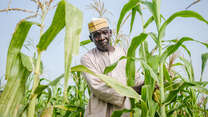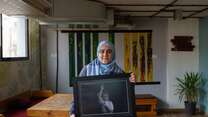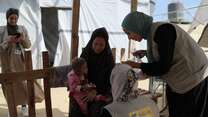WHO WE ARE
The mission of the International Rescue Committee (IRC) is to help people whose lives and livelihoods are shattered by conflict and disaster to survive, recover and gain control of their future. Our vision is that the IRC will lead the humanitarian field by implementing high-impact, cost-effective programs for people affected by crisis, and shape global policy and practice by sharing our learning and experience with others.
All IRC programs are designed to achieve meaningful change in people’s health, safety, education, economic wellbeing and ability to influence the decisions that affect their lives. The Economic Recovery and Development (ERD) unit at the IRC works to ensure that those we serve have their most basic survival needs met and have the combination of assets and income to prosper.
WHY OUR WORK MATTERS
Each year conflict, floods, famine and drought affect over 250 million people.
When crisis happens, people are either forced to flee—leaving everything behind—or struggle to survive in unstable regions. Their means of supporting themselves are often destroyed. They may not be able to eat every day. Their shelter may be insecure. They must concentrate on short-term strategies to meet their basic, urgent needs rather than on their longer-term economic wellbeing. In these contexts, focus on both basic needs and income and asset generation can be equally critical in addressing lasting economic wellbeing.
What is economic wellbeing?
- People meet basic needs and avoid negative coping mechanisms
- People are food secure
- People generate income and assets
- People are able to use and control resources
WHAT WE DO
IRC practitioners provide technical assistance to more than 30 country programs. Technical advisors are charged with staying abreast of the best available research and practices in their respective fields and sharing these with the IRC’s frontline teams. They also lead advocacy strategies to encourage partners and policy makers to adopt the interventions proven to be effective based on our research and experience.
The ERD unit supports people’s economic wellbeing by implementing evidence-based programming and approaches.
Market-Based and Market-Strengthening Approaches
Supporting the recovery, development and strengthening of markets is essential to achieving measurable improvements in the lives of those we serve. We engage with markets before, during and after crises in order to identify needs across market supply and demand, address gaps in market systems, and develop market-relevant interventions for more sustainable impact. The IRC has developed resources to help relief agencies map markets before and during emergencies.
Emergency Market Mapping and Analysis Toolkit (EMMA): EMMA is an approach to assessing market systems in post- emergency contexts that aims to improve emergency responses by encouraging and assisting humanitarian actors to better understand, support and make use of local market-systems in disaster zones.
Pre-Crisis Market Analysis (PCMA): PCMA is a practical, step-by-step resource to guide practitioners in conducting market assessments before emergencies happen in contexts that are prone to recurring crises. This early analysis helps practitioners and decision makers anticipate how certain selected ‘critical’ markets will behave or function if and when a shock occurs.
Agricultural value chain development
The IRC implements agricultural value chain projects across Africa, Europe and Asia to help crisis affected people restart farming as a business. The IRC helps these producers access markets, sustainably increase their profits from farming and generate income. In Northern Uganda, the IRC supported returnees and internally displaced persons (IDPs) who had previously been small farmers to re-enter profitable agricultural value chains like soya, beans, cotton and maize. Participants were trained in agricultural practices, marketing, and given access to information and financial services.
After a value chain analysis in Northern Uganda, IRC staff identified an opportunity to sell cotton to one of the world’s largest cotton processing firms. In collaboration with local leaders, buyers and producers, over 750 acres of land was opened for food and cotton crop production.
Initial sales of over $25,000 transformed the lives of more than 400 households. Similar value chain strengthening programs involving small holder farmers and the private sector have been supported in Zimbabwe and Myanmar.
Micro, Small and Medium Enterprise (MSMEs) Support
In addition to their regular business operations, MSMEs provide quality goods and services to refugees and IDPs through cash and voucher programming. Perhaps even more crucial, MSMEs can play key roles in the transition to early recovery efforts, supporting employment creation and training opportunities.
IRC research on MSMEs in Northern Syria and Lebanon showed that MSMEs face a number of barriers to growth and stability, including inadequate supply or reliance on limited wholesaler networks, exchange rate fluctuations, access to capital and inconsistent demand. The IRC develops solutions that increase access to wholesalers, introduce farmers to potential new markets or networks, and support the transport and access to goods, capital, and financial services. We provide much needed capital to support start-up businesses, mentorship to guide new entrepreneurs and follow-on support to help businesses grow.
Microentrepreneurship
Cities are beacons of economic opportunity. However, opportunities are frequently out of reach for refugees, and other vulnerable residents in these cities. As a result, urban refugees struggle to find sustainable livelihoods and achieve long-term self-reliance. At the same time, programs to support them lack investment and evidence to show what works. The International Rescue Committee (IRC) and IKEA Foundation have partnered to find a solution to this challenge, with the ultimate goal of changing policies, practices, and investments to better support urban refugee livelihoods. Initially focusing on Kampala and Nairobi, Re:BUiLD is working to build and share the evidence base for innovative, sustainable livelihoods solutions that can be adopted to support refugees and host residents in other cities in East Africa and beyond.
Food Security
We address food security through a comprehensive approach that tackles the economic factors influencing the consistency and reliability of food availability, access, and utilization before, during, and after emergencies. This approach includes a combination of forecast-based anticipatory action, basic needs assistance during and in the aftermath of crises, and climate-adaptive strategies to recover and develop resilient livelihoods and food systems. The IRC’s anticipatory action work supports clients in anticipating and absorbing the impact of climate shocks through cash and livelihood interventions that follow the forecast for floods and droughts. Cash assistance is provided during and after crises to help communities meet their basic needs and stimulate local economies when markets are functional. Additionally, the IRC promotes climate-smart agriculture to enhance adaptive capacities of communities impacted by climate change and ensure sustainable, resilient livelihoods. This involves implementing sustainable practices that protect the natural resource base vital for agricultural livelihoods, supporting healthy diets and stable incomes, and developing market systems for climate-resilient crops and livestock. Through these strategies, the IRC aims to build resilient food systems and improve food security for vulnerable populations across the arc of the crisis.
Client Centric Bundled Services
Many of the world’s poor and vulnerable are forced to create economic opportunities for themselves. Demographic growth
is significant, and companies are not starting and growing fast enough to meet demand for new jobs. The IRC’s enterprise development and employment programs aim to address both supply and demand side challenges of the labor market by offering a bundle of employment and entrepreneurship services customized to the individual needs and situations of our clients. The combination of services offered vary across a range of emergency and recovery contexts but may include foundational skills development, job placement, entrepreneurship training and private sector strengthening.
The IRC developed a center-based model to deliver bundled employment services. By visiting the IRC’s Livelihoods Centers, job seekers are able to access multiple services—such as job matching and referrals, business and life skills training, vocational training, legal counseling and entrepreneurship support—in one place. Business owners and entrepreneurs can access capacity- building support, mentorship opportunities, and business start-up support and grants. To date, 24,000 people in Lebanon have accessed these services through the IRC’s Livelihoods Centers.
Cash Relief
Cash relief programming (CTP) is one of the fastest growing evidence-based interventions in the humanitarian community.
Cash transfers are direct transfers of monetary value to people living crisis to assist them in situations where opportunities for employment, income, livelihood or economic production are extremely limited or have ceased to exist.
Providing cash can help maintain people’s dignity by empowering them with choice instead of treating them like passive recipients of relief. Additionally, cash transfers provide financial injections into local economies, which have potential benefits for local vendors, producers, markets and trade.
Over the next five years, the IRC seeks to deliver 25% of its humanitarian assistance through cash, up from 6.26% in fiscal year 2015, and to have active cash transfer programs in 75% of the IRC’s country offices. The IRC is well on its way to meeting this goal. In FY15, the IRC delivered over US $11,770,000 in cash assistance to 75,625 beneficiaries, a 35% growth in cash assistance delivered from FY14.
Preparedness – 72 Hours
The IRC’s organizational strategy sets a target of delivering survival assistance—including cash relief—within 72 hours
of an emergency. Current cash transfer programs have long start-up times, and many emergency programs default to in-
kind distributions of material assistance. The IRC is focused on decreasing cash delivery time when crisis strikes, thereby assuring broader use of cash over in-kind assistance.
To achieve this, the IRC is pre-positioning cash transfer programs ahead of crises to allow rapid delivery of cash when crisis strikes. With support from MasterCard Worldwide, the IRC has developed a Cash Preparedness Roadmap (CPR) to provide rapid cash delivery and electronic payments to beneficiaries in crisis settings across all IRC country offices.
E-payment systems – solutions for scale
The IRC is adopting electronic payment (e-payment) systems to deliver cash transfers during emergency and recovery programs. While electronic payments present an optimal way of transferring aid to more people more efficiently, only 30% of countries facing severe humanitarian crises have the necessary digital and financial infrastructure in place to support digital payments in an emergency.
In countries with inadequate digital financial infrastructure, the IRC’s Global Payments Toolbox (GPT) prepositions stocks of prepaid cards and pre-establishes standard operating procedures, so in the event of a disaster, electronic payments can be made through global payment providers.
When the necessary digital financial infrastructure exists, the IRC partners with vetted banks, financial service institutions and technology companies to establish safe, fast and easy-to-use systems for cash disbursements to target populations. The IRC is digitally delivering cash assistance throughout its Syria region response and increasingly in countries such as Pakistan and Somalia.
Women’s Economic Empowerment
Women and girls face a myriad of gender-specific challenges, including lesser decision-making power over resources, fewer opportunities to participate in the work force, unequal educational opportunities, and a lack of reproductive and sexual health services. As a result, they are forced to depend on other, often male, family members.
The IRC enhances women’s economic opportunities, promotes their effective control over resources and offers safe spaces for women and girls to develop support networks and life skills. The IRC’s innovative Economic and Social Empowerment (EA$E) model gives women access to financial resources and provides opportunities to both women and men to create more equitable and safe gender dynamics within their households. The IRC is implementing this comprehensive model for nearly 25,500 women in nine countries. To date, participating women have been able to save almost $1.4 million and earn a mean profit on their savings of $588,000.
The IRC integrates a gender-sensitive approach to value chain development, especially in the agricultural sector. In Uganda and Zimbabwe, we increasingly work with female farmers to safely enhance their agency. In Uganda, women’s participation in leadership roles increased from 30 to 72 percent, and more women-owned businesses were established.



